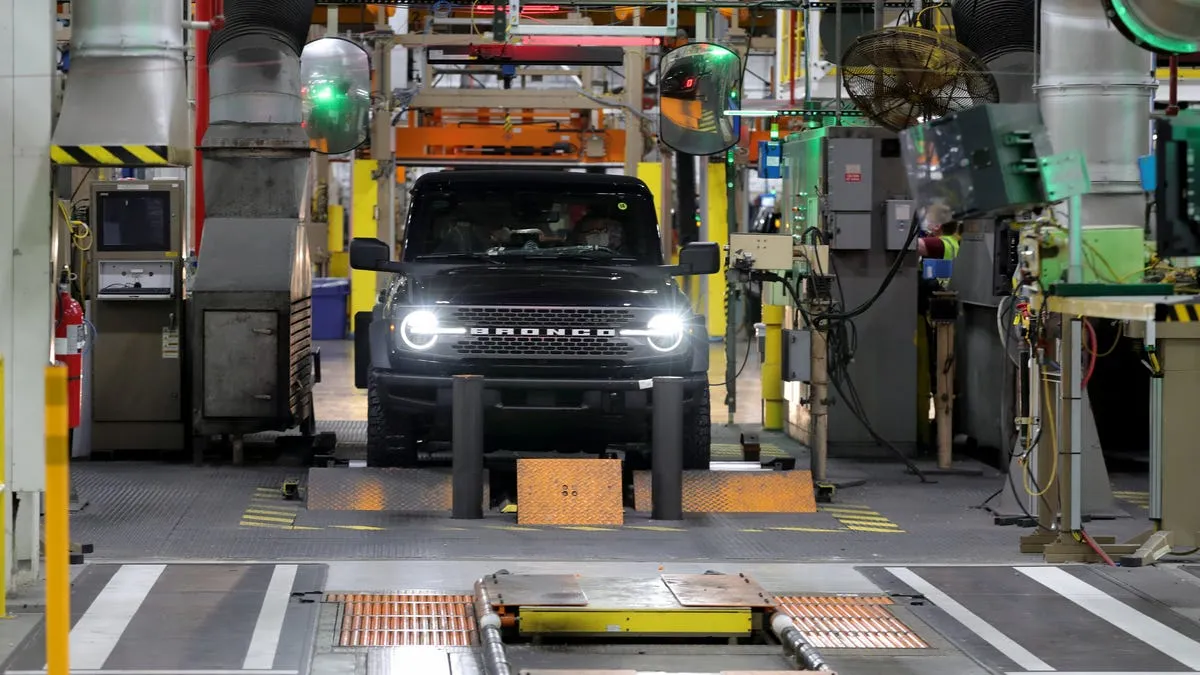
Consumer confidence has significantly weakened, leading to a noticeable decline in car sales. As buyers face potential price hikes and grapple with broader economic anxieties, many are hesitating to make purchases. Elevated inventory levels at various dealerships indicate a slowdown in sales and a decrease in lease returns, suggesting that the market is experiencing a notable shift.
While some industry experts remain optimistic that car sales will endure, others caution against impending production disruptions, potential price increases, and even layoffs if current tariffs persist. Jim Seavitt, a Ford dealer and owner of Village Ford in Dearborn, expressed his unease, stating, “We’re down 50% in leads. Everything’s off 40% to 50%. People just aren’t looking at cars right now.” His sentiments echo the early days of the Great Recession in 2008, a period marked by economic turmoil.
Seavitt’s apprehension is not isolated; it resonates throughout the industry. Many local UAW leaders at both Ford Motor Co. and General Motors have voiced their worries about the ongoing tariff war and its potential to disrupt production. The uncertainty surrounding President Donald Trump’s policies has contributed to a volatile auto market, with some leaders advising members to save their finances. One UAW leader noted, “I am concerned about manufacturing as a whole this year because people can’t afford to buy groceries, so they aren’t going to buy a $70,000 car.”
This sentiment is further reflected in the significant drop in sales, with dealers reporting a 50% decrease and inventories accumulating as a result. A local UAW leader remarked that the overall manufacturing outlook for the year appears bleak. Many union leaders chose to speak anonymously due to the sensitivity of topics like politics, tariffs, and economic conditions.
Despite some analysts believing that consumers will always require new transportation, the ongoing tariff changes have created a challenging environment for the manufacturing sector. A recent report from the Empire State manufacturing index indicated a drastic decline in factory activity in New York, signaling a broader trend affecting the entire U.S. economy. The study reported a decrease in employment levels and hours worked, along with rising input prices.
The UAW leader's observations on the factory floor reflect these findings. Concerns about potential layoffs are prevalent, and despite reassurances that tariffs could redirect manufacturing to the U.S., the reality of building new facilities is daunting, requiring billions of dollars and years of planning. Ford's CEO, Jim Farley, acknowledged the chaos caused by tariff threats, stating that new plants in the U.S. are not on the horizon.
The current tariff landscape includes a 20% increase on goods imported from China and 25% tariffs on Canadian and Mexican imports. Although some companies in the auto industry are exempt until April 2, the overall atmosphere remains tense. The ongoing tariff war has led to retaliatory measures from other countries, further complicating the situation for automakers who rely on global supply chains.
As a result, car manufacturers face rising costs, which could translate to higher prices for consumers already struggling with affordability. With the S&P Global Mobility estimating a 50% chance of the auto industry experiencing an extended disruption due to tariffs, the implications for production and sales are significant.
Recent data illustrates that new vehicle sales in early 2023 have been buoyed by momentum from a strong fourth quarter, but this trend is beginning to falter. Mark Schirmer, director of industry insights at Cox Automotive, noted that consumer sentiment is dampening, fueled by economic uncertainties. The daily chaos in Washington has negatively impacted consumer confidence, leading to a cautious approach toward big-ticket purchases.
According to Edmunds.com, the average transaction price for a new car in February was $49,350, down from January's figure but still above last year's price. The market has seen a drop in lease returns, which has historically driven dealership sales, particularly in Detroit's competitive market.
At Matick Automotive Group, sales were initially slow in February, but a recent uptick has been observed as consumers rush to buy before potential price hikes due to tariffs. Partner Paul Zimmermann emphasized the need for dealerships to adapt, advising sales staff to inform customers about the looming threat of rising prices. His inventory remains healthy, and he has no plans for layoffs, though he acknowledges the cyclical nature of the industry.
Jim Seavitt at Village Ford reported a 90-day supply of inventory despite sluggish sales, attributing part of the slowdown to a lack of lease returns. The absence of customers returning for new leases has compounded the issue, with Seavitt's sales figures reflecting a significant dip compared to previous months.
As local UAW leaders express concerns reminiscent of the 2008 recession, many aspects of the auto industry remain uncertain. The potential for further tariffs, production disruptions, and economic challenges loom large. While some dealers remain optimistic about the return of consumer confidence, the overall outlook suggests a need for cautious navigation through the current economic landscape.
In a rapidly changing environment, the auto industry must adapt to consumer needs and economic realities while balancing the implications of ongoing tariff policies. As one UAW leader succinctly put it, “The writing's on the wall,” indicating that both dealers and consumers must be prepared for potential challenges ahead.